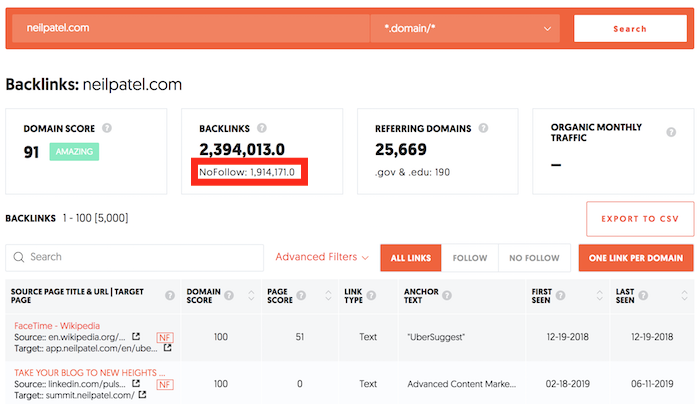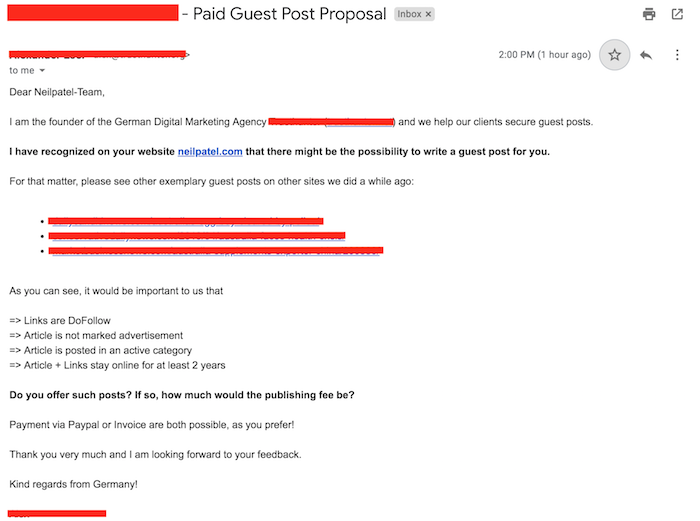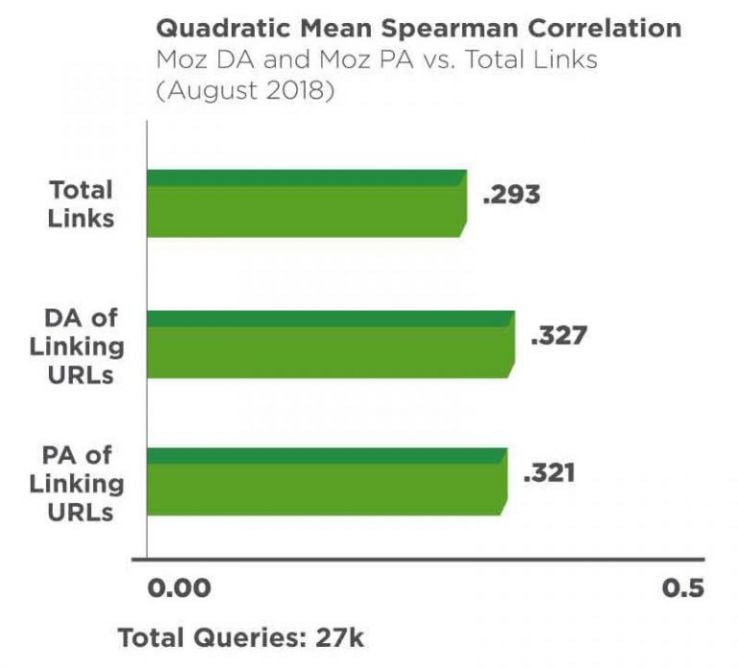Article URL: https://mux.com/jobs/?hnj=3 Comments URL: https://news.ycombinator.com/item?id=20993619 Points: 1 # Comments: 0
Author: Cathy Hicks
Google’s New Link Building Guidelines
In case you missed it, Google has just changed up the rules for link building.
It used to be that when people link to you, the link would either be a dofollow link or a nofollow link.
Well, that’s now changed.
They are now introducing 2 more link types that will affect
SEOs.
Now before we get into the 2 new link types, make sure you read the whole post. Because not only will I explain Google’s requirements, but I will break down what this means for SEOs.
The current landscape
The current SEO landscape is simple… especially when it comes to link building.
The more dofollow (regular links) links you can get the better your search rankings.
If you are unsure of the number of links you have or the type, just go here and enter in your domain.

You’ll see a count of total backlinks along with the total amount of nofollow links pointing to your site.
Now, when you are link building, if you are paying for links or leveraging tactics like guest posting, Google wants you to nofollow those links because they don’t think you should be leveraging tactics like guest posting to manipulate rankings.
And as for buying links, you shouldn’t do that as it is a simple way to get penalized or banned from Google.
So don’t send emails like this if you are trying to build links… it’s a big no, no.

How does Google look
at links?
Google’s algorithm is smart. Sure, they ideally want you to nofollow links if they are bought or not naturally earned (such as from guest posts), but many SEOs break the rules.
They aren’t going to say it publicly but they do these things. And because Google isn’t dumb, they also know.
Google can easily
identify when a post on these big news sites aren’t earned because many of them
have signs all over them that Google can detect.
For example, here is
an example of a guest
post from me.

Forbes, of course, uses nofollows links, but it wasn’t always that way.
Google can easily detect it is a guest post through verbiage on the page like “former contributor” or “guest contributor”.
And even if they didn’t label me as a guest contributor, Google can use other signals to figure out that this link shouldn’t be given much weight when it comes to SEO just by reading the URL structure of that article on Forbes.
Let’s take a closer
look at the URL
https://www.forbes.com/sites/neilpatel/2016/12/26/my-biggest-regret-in-life-going-to-college/#5f74f3a91ac7
Do you see the big
issue with the URL?
It’s clear that an author can have their own subsection on Forbes through the “site” folder structure. Now that doesn’t mean all “Forbes sites” are bad, but they clearly know which one is from staff writers because they are clearly marked.

Those signals (among others) that Google probably won’t disclose (nor should they) make it easy for Google to determine if a link is natural or earned.
If Google doesn’t want to count a link from a specific author, they can just ignore it on their end.
So, whether it is nofollowed or followed, on their end they can systematically control whether a link should help your rankings or if it shouldn’t.
As John Mueller from Google once said, in the context of bad links…
If we recognize them, we can just ignore them – no need to have you do anything in most cases.
Now keeping that in
mind, here are the changes Google wants webmasters to make.
Google’s new link
policy
If someone pays you
for a link or you are buying a link, Google now wants you to mark it as sponsored.
Not just in the text of the site, but more so through the link attribute:
Rel=”sponsored”
And if you build links through user-generated content, they want you to mark the links with the attribute:
Rel=”ugc”
The same goes for site owners. For example, if you have a forum on your site because the content is user generated, the links that people place should contain a rel=”ugc”.
You can still use the nofollow attribute or if you want you can use a combination of the above. For example, if you have a paid link you can use:
Rel=”nofollow sponsored”
So, what’s the
purpose of this change?
Well, here is how
Google puts it:
All the link attributes — sponsored, UGC and nofollow — are treated as hints about which links to consider or exclude within Search. We’ll use these hints — along with other signals — as a way to better understand how to appropriately analyze and use links within our systems.
Now if you are wondering what that means, Google is pretty much saying that adding these attributes will give them a better idea on if they should crawl the link or not. Or how they should analyze the link when it comes to indexing or SEO.
This change goes into effect March 1, 2020, and don’t worry because you don’t have to make modifications to your old links. The ones that were nofollow can just be left as nofollow.
And even in the future, if you decide to just use nofollow instead of “sponsored”, you’ll be fine.
What does all of this mean for SEOs?
As I mentioned
earlier, I would provide my own insights and opinions on why Google is doing this.
We all know their algorithm is sophisticated and hard to game. But, just like any other algorithm or computer, it isn’t perfect.
By webmasters and SEOs labeling the type of links they are building and the purpose of them, it will make it easier for Google to learn how we use different link types and it will help their algorithms more quickly and easily identify link types and the context they are used in.
For example, if thousands of people use rel=”ugc” for links generated through guest posts, it may help train Google’s algorithm that these links were actually created by random people instead of the webmaster and they should be discounted.
Of course, Google already can identify wikis, forum, and other types of user-generated content, but this helps them tighten things up and make things more accurate.
They can also decide to take a more relaxed stance on certain link types. For example, maybe they will decide to count UGC links when it comes to link building, but they may decide to only give it 1/3rd the weight of a naturally earned link.
In addition to that, this also provides them with more signals on if the URL linked to should be potentially crawled or ignored.
But in the long run, as their algorithm becomes more accurate, it’s safe to say that the real solution to winning is putting the user first.
Their goal isn’t to rank a site at the top that has “perfect SEO”. They want to rank the site that people love the most.
Hence, you’ll want to focus on creating an amazing user experience, building a great product/service, creating mindblowing content, and anything else your competition isn’t doing.
As for link building though, links will always be hard to come by, so they will be part of their algorithm for the foreseeable future. And as the data shows, there is a strong correlation between links and rankings.

So one thing I would recommend is that you build as many links as possible, even if they are user-generated links. As long as they are from relevant sites, the referral traffic can generate you sales or leads. And if Google starts placing some value on these user-generated links, it can help boost your rankings.
Now that doesn’t mean you should go out to forums and spam your link everywhere. It means you should go find all of the user-generated content sites, provide a ton of value, AND ONLY IF IT MAKES SENSE, add a link back to your site when it benefits the reader.
Conclusion
Over the next year or so you’ll see adjustments in how SEOs build links.
First off you’ll start seeing companies like Ahrefs and the SEMrush show you nofollow, dofollow, UGC, and sponsored backlinks. This one change will help SEOs build better links and spend their effort on the links that actually help with rankings.
Secondly, my hunch is UGC links will eventually carry some weight. Probably not a ton, but more than 0 as long as they are from relevant sites, the link is within context and it provides value to the end-user.
And lastly, most webmasters probably won’t use sponsored or UGC attributes anytime soon. It will probably take another year before they really catch on, which means for now you will just have to focus your efforts on dofollow links.
So, what do you
think about the new change?
The post Google’s New Link Building Guidelines appeared first on Neil Patel.
Do Not Make These Mistakes!
Do Not Make These Mistakes!
There are a couple of gigantic net advertising blunders that can spoil the entire factor for web advertising in the initial area when it comes to internet advertising and marketing. Below are a couple of web marketing blunders you will certainly wish to prevent in all prices:
Not having a web marketing target. When attempting their hand at net advertising and marketing, this is a significant net advertising and marketing blunder than several amateur residence company proprietors make. It is exceptionally vital for your web marketing project that you recognize that you are targeting the web marketing at.
Be really specific when you are doing web advertising and marketing that you comprehend your target market and also provide them something via your web advertising and marketing that they will certainly be able to associate to. Web advertising and marketing is concerning attaching with others in a method that they can best recognize with net advertising.
The greatest point for web advertising and marketing is recognizing exactly how to place your web advertising and marketing creative thinking to utilize. If you can be clever with your net advertising and marketing, you do not constantly require to invest a whole lot of cash on net advertising.
Due to the fact that of web link web pages that are not permitted, an additional error in net advertising and marketing is being eliminated from crucial search engine websites. Check to make certain you are not damaging any kind of search engine guidelines via your web advertising when you are doing web advertising and marketing. Showing up in an online search engine is a massive component of web marketing, which net benefit should be taken seriously.
It is very vital for your web advertising and marketing project that you understand that you are targeting the web advertising at.
Be really specific when you are doing web advertising and marketing that you recognize your target market as well as offer them something via your net advertising that they will certainly be able to connect to. If you can be clever with your web advertising and marketing, you do not constantly require to invest a whole lot of loan on net advertising.
When you are doing web advertising, check to make certain you are not damaging any type of search engine guidelines with your net advertising and marketing.
The post Do Not Make These Mistakes! appeared first on ROI Credit Builders.
How to Set Up a New Business in Maine
Starting a Business in Maine
A new business in Maine is in reach. So have you been wondering: just how do I start a business in Maine? And more importantly, can I do so no matter what the economic conditions are? Can I start a new business in Maine during a recession?
New Business in Maine: Pros and Cons
Business Insider called Maine the second worst state to start a new business in, according to a 2016 article. And this is for the entire nation. There was a low density of startup companies and low productivity numbers. Its $37,958 GDP per capita is the seventh lowest in the country. Maine’s remoteness does not help, either.
Recent Confusing Metrics
In 2018, Forbes essentially agreed, placing Maine at a dismal 48th. But Fit Small Business, also in 2018, named Maine to its more or less covet-worthy 17th spot.
So what gives?
First of all, keep in mind that all three sites are using different methodologies.
So let’s start with the good news. Per Fit Small Business, Maine is number one for access to capital! Maine also scored well for quality of life and its labor market. It also did well for the costs of starting a business. But the state was below average for taxes, startup activity, and cost of living.
And now the bad news. Forbes places Maine at dead last when it comes to its regulatory environment. And Maine does poorly for growth prospects, business costs, and economic climate. It scored below average for quality of life and labor supply as well.
Why did Maine come out on both ends of the spectrum for quality of life? This can be a somewhat subjective measurement. Only you can decide if Maine’s remoteness and climate suit or stifle you. It would appear it’s not too expensive to start up a business. But it seems expensive to maintain one.
Labor market (per Fit Small Business) is a measure of location desirability and percent of people with bachelor’s degrees. So it would seem there aren’t too many people out there to hire (per Forbes). But those who are available are more likely to have bachelor degrees. This is useful when starting a more technical business. But keep in mind, there will be competition for these better-qualified job candidates.
New Business in Maine: Programs
Funding assistance is available to most sizes and kinds of Maine business. The state has several programs which offer what it calls “comprehensive incentives.” These programs include progressive tax reimbursement policies. They also include a nationally recognized “Community Development Block Grant” program. The program provides funds to projects like infrastructure development
Pine Tree Development Zone Program
The “Pine Tree Development Zone” (PTDZ) program offers eligible businesses the opportunity to virtually eliminate state taxes for up to ten years. The goal is to create quality jobs and support new or relocating Maine businesses.
Targeted industries include environmental tech, biotechnology, and composite materials. They also include precision manufacturing, information technology and financial services. Benefits from the PTDZ include insurance premium tax credits, and corporate income tax credits. They also include payroll and property tax credits, income tax reimbursement, etc.
Three Ring Binder Program
Maine’s “Three Ring Binder” is the state’s $32 million public and private collaboration. It is between Pioneer Broadband, Great Works Internet, and the University of Maine system. The idea is to create an open access fiber optic network. It is to extend into rural and disadvantaged areas of the state.
Maine right now is in first place for high speed broadband intensity. And it is seventh place for high speed broadband availability. Newly installed 1,100 miles of fiber optic cable should enhance the state’s health care system. It should also positively impact academia and small business.
Here is precisely how to start a new business in Maine.
Start a New Business in Maine – Maine New Business Secretary of State Requirements
Register a Business Name
The Maine government website says it is not necessary to register a trade name in Maine.
A Maine corporation must have a unique corporate name for the business. Before a business owner can file to incorporate, they should check to be sure that the name they want is not already in use by another corporation.
Search online records and government databases to find out if a name is already in use by another corporation. To search a database of Maine corporations, visit at the official website of the Maine Secretary of State.
While not necessary, a business owner can still apply to reserve the corporate name they want until they can file to incorporate. The application is online on the official website of the Maine Secretary of State. There is a $20.00 filing fee and the name that they have chosen will then be reserved for a period of 120 days.
Business Permits and Licenses
The Maine government website will be your best bet. It includes a list of licenses you might need.
Local Permits and Licenses
Check if there may be any local licensing or permit requirements.
For example, in Bangor, you will need to go to the Business Licenses page on the Bangor city website.
Start a New Business in Maine – Business Registration
Go to the Maine Bureau of Corporations, Elections and Commissions, by way of the Department of Secretary of State. They have the requisite forms.
Tax Registration
Go to the Maine Revenue Services to use their registration service.
Start a New Business in Maine – Virtual Offices
Alliance and Regus do not offer Maine virtual office space. DaVinci offers Portland virtual business office space. Opus has Waterville virtual business offices. An extensive search did not turn up any Maine virtual office addresses in Augusta, Bangor, or Caribou.
Therefore, business owners looking for virtual business offices in these metropolitan areas should connect with local business owners.
Or they can try computer user groups for leads in this area. Other options may include finding virtual business office space in nearby states. These are Massachusetts, New Hampshire, and Vermont.
Start a New Business in Maine – Establish Business Credit
Small business credit is credit in a company’s name. It doesn’t connect to an owner’s individual credit, not even if the owner is a sole proprietor and the only employee of the business.
Accordingly, a business owner’s business and consumer credit scores can be very different.
The Benefits
Because business credit is independent from personal, it helps to secure an entrepreneur’s personal assets, in case of court action or business bankruptcy.
Also, with two distinct credit scores, a business owner can get two separate cards from the same vendor. This effectively doubles buying power.
Another advantage is that even startup businesses can do this. Going to a bank for a business loan can be a formula for frustration. But building business credit, when done right, is a plan for success.
Consumer credit scores depend on payments but also various other elements like credit usage percentages.
But for small business credit, the scores really only hinge on whether a company pays its debts on a timely basis.
Learn more here and get started toward building business credit attached to your company’s EIN and not your SSN.
The Process
Establishing company credit is a process, and it does not happen without effort. A small business will need to actively work to build company credit.
Nevertheless, it can be done easily and quickly, and it is much swifter than establishing personal credit scores.
Merchants are a big aspect of this process.
Accomplishing the steps out of order will lead to repetitive rejections. Nobody can start at the top with company credit. For example, you can’t start with retail or cash credit from your bank. If you do, you’ll get a rejection 100% of the time.
Start a New Business in Maine – Small Business Fundability
A business needs to be fundable to lending institutions and vendors.
That’s why, a business will need a professional-looking web site and email address. And it needs to have website hosting from a vendor like GoDaddy.
And also, business phone and fax numbers must have a listing on ListYourself.net.
Additionally, the business phone number should be toll-free (800 exchange or comparable).
A company will also need a bank account devoted only to it, and it must have every one of the licenses essential for operating.
Learn more here and get started toward building business credit attached to your company’s EIN and not your SSN.
Dealing with the IRS
Visit the IRS web site and acquire an EIN for the company. They’re free. Select a business entity like corporation, LLC, etc.
A business can start off as a sole proprietor. But they will probably wish to change to a form of corporation or an LLC.
This is in order to limit risk. And it will optimize tax benefits.
A business entity will matter when it concerns taxes and liability in case of a lawsuit. A sole proprietorship means the business owner is it when it comes to liability and tax obligations. No one else is responsible.
Sole Proprietors Take Note
If you run a company as a sole proprietor, then at least be sure to file for a DBA. This is ‘doing business as’ status.
If you do not, then your personal name is the same as the company name. Consequently, you can find yourself being personally liable for all company debts.
Plus, per the IRS, using this arrangement there is a 1 in 7 possibility of an IRS audit. There is a 1 in 50 chance for corporations! Steer clear of confusion and drastically reduce the chances of an Internal Revenue Service audit simultaneously.
Setting off the Business Credit Reporting Process
Begin at the D&B website and obtain a free D-U-N-S number. A D-U-N-S number is how D&B gets a business in their system, to produce a PAYDEX score. If there is no D-U-N-S number, then there is no record and no PAYDEX score.
Once in D&B’s system, search Equifax and Experian’s sites for the business. You can do this at www.creditsuite.com/reports. If there is a record with them, check it for correctness and completeness. If there are no records with them, go to the next step in the process.
By doing this, Experian and Equifax will have something to report on.
Vendor Credit Tier
First you need to build trade lines that report. This is also referred to as the vendor credit tier. Then you’ll have an established credit profile, and you’ll get a business credit score.
And with an established business credit profile and score you can start to obtain credit in the retail and cash credit tiers.
These varieties of accounts have the tendency to be for the things bought all the time, like marketing materials, shipping boxes, outdoor work wear, ink and toner, and office furniture.
But first of all, what is trade credit? These trade lines are credit issuers who will give you initial credit when you have none now. Terms are typically Net 30, versus revolving.
So, if you get an approval for $1,000 in vendor credit and use all of it, you will need to pay that money back in a set term, like within 30 days on a Net 30 account.
Details
Net 30 accounts need to be paid in full within 30 days. 60 accounts need to be paid in full within 60 days. Compared to with revolving accounts, you have a set time when you have to pay back what you borrowed or the credit you used.
To start your business credit profile the right way, you need to get approval for vendor accounts that report to the business credit reporting agencies. Once that’s done, you can then make use of the credit.
Then repay what you used, and the account is on report to Dun & Bradstreet, Experian, or Equifax.
Vendor Credit Tier – It Makes Sense
Not every vendor can help in the same way true starter credit can. These are vendors that will grant an approval with very little effort. You also need them to be reporting to one or more of the big three CRAs: Dun & Bradstreet, Equifax, and Experian.
You want 5 to 8 of these to move onto the next step, which is the retail credit tier. But you may need to apply more than once to these vendors. So, this is to verify you are responsible and will pay on time.
Retail Credit Tier
Once there are 5 to 8 or more vendor trade accounts reporting to at least one of the CRAs, then progress to the retail credit tier. These are businesses which include Office Depot and Staples.
Just use your Social Security Number and date of birth on these applications for verification purposes. For credit checks and guarantees, use the company’s EIN on these credit applications.
One example is Lowe’s. They report to D&B, Equifax and Business Experian. They want to see a D-U-N-S and a PAYDEX score of 78 or more.
Fleet Credit Tier
Are there 8 to 10 accounts reporting? Then move onto the fleet credit tier. These are service providers like BP and Conoco. Use this credit to buy fuel, and to repair, and take care of vehicles. Only use your SSN and date of birth on these applications for verification purposes. For credit checks and guarantees, make sure to apply using the company’s EIN.
One such example is Shell. They report to D&B and Business Experian. They want to see a PAYDEX Score of 78 or more and a 411 business telephone listing.
Shell may claim they want a specific amount of time in business or profits. But if you already have adequate vendor accounts, that won’t be necessary. And you can still get approval.
Learn more here and get started toward building business credit attached to your company’s EIN and not your SSN.
Cash Credit Tier
Have you been responsibly managing the credit you’ve up to this point? Then progress to the cash credit tier. These are service providers like Visa and MasterCard. Just use your SSN and date of birth on these applications for verification purposes. For credit checks and guarantees, use your EIN instead.
One example is the Fuelman MasterCard. They report to D&B and Equifax Business. They want to see a PAYDEX Score of 78 or more. And they also want you to have 10 trade lines reporting on your D&B report.
Plus, they want to see a $10,000 high credit limit reporting on your D&B report (other account reporting).
In addition, they want you to have an established company.
These are service providers like Walmart and Dell, and also Home Depot, BP, and Racetrac. These are frequently MasterCard credit cards. If you have 14 trade accounts reporting, then these are feasible.
Start a New Business in Maine – Monitor Your Business Credit
Know what is happening with your credit. Make certain it is being reported and attend to any inaccuracies as soon as possible. Get in the practice of checking credit reports and digging into the details, and not just the scores.
We can help you monitor business credit at Experian and D&B for only $24/month. See: www.creditsuite.com/monitoring.
Update Your Data
Update the info if there are mistakes or the data is incomplete.
Start a New Business in Maine – Fix Your Business Credit
So, what’s all this monitoring for? It’s to dispute any problems in your records. Mistakes in your credit report(s) can be fixed. But the CRAs typically want you to dispute in a particular way.
Disputes
Disputing credit report inaccuracies usually means you send a paper letter with duplicates of any proofs of payment with it. These are documents like receipts and cancelled checks. Never mail the originals. Always mail copies and retain the original copies.
Fixing credit report errors also means you precisely detail any charges you challenge. Make your dispute letter as understandable as possible. Be specific about the concerns with your report. Use certified mail so that you will have proof that you sent in your dispute.
A Word about Building Business Credit
Always use credit responsibly! Don’t borrow more than what you can pay back. Keep track of balances and deadlines for repayments. Paying promptly and in full will do more to raise business credit scores than almost anything else.
Establishing company credit pays off. Good business credit scores help a small business get loans. Your lender knows the business can pay its debts. They know the business is for real.
The small business’s EIN connects to high scores and credit issuers won’t feel the need to require a personal guarantee.
Business credit is an asset which can help your business for years to come.
Learn more here and get started toward opening a new business in Maine.
Want to start a new business someplace else in America? Then check out our handy guide to starting a business in any state in the country.
The post How to Set Up a New Business in Maine appeared first on Credit Suite.



